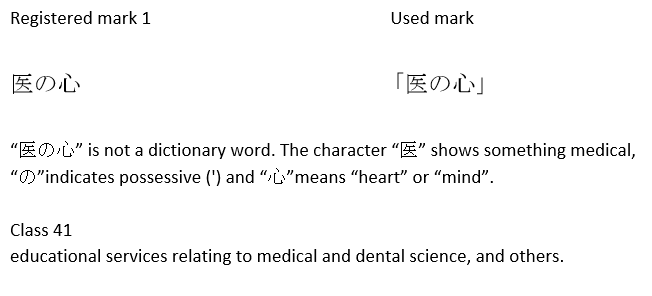2018.08.19
Vol.3 (MEDICAL MIND)
H28(WA)No.28591 Infringement suit judged in Tokyo District Court

Summary
Based on the use of the same mark to the registered mark by third parties and the contents of the service of the defendant, the court judged that the defendant does not infringe the trademark right because the use should not be used as a trademark use. Specifically, this judgment was done based on the following finding of the fact.
-The meaning of “things doctors should know” can be naturally understood from the word “医の心” itself and the word has been frequently used as the above meaning or “things people should know regarding medical care” in books or programs in the field of medical care
– The word “医心” can be interpreted as an abbreviation of the word “医の心” and is generally used as the meaning “things people should know regarding medical technique”
-The defendant does not provide the knowledge for passing the examination of medical department at colleges, but provides curriculums for training stance or mental attitude as a doctor
My comments
Although the Judge found that the word “医の心” has a certain meaning based on the word itself and the use of the word by third parties, the number of the use examples is only five. The court indicated that two of these were made more than 25 years ago and this period was emphasized. In addition, the fact that the one of the use examples was found in the book written by a doctor which was considered as an authority on cardiac surgery was also emphasized. Therefore, it seems that the court considers use in the past as well as current use or use in authoritative books as being important. As for “医心”, the Judge seems to have deemed this word to be generally used simply based on the fact that the word is in Kojien, which is an authoritative dictionary in Japan.
According to the decision, the plaintiff did not assert that the use examples are a few or “医心” is not generally used. I am curious about whether the conclusion would have changed if such assertions had been made.
In any case, the court did not deny the inherent distinctiveness of “医の心” and “医心”, and we believe the fact that the contents of the defendant’s service corresponded to the above-indicated meaning strongly affected the judgment regarding non-trademark use. If the service had been for the purpose of improving the knowledge for passing the examination of medical department at colleges, the result may have changed. Hence, if the inherent distinctiveness of the subject registered mark had been disputed, there would have been possibility of the distinctiveness being admitted.
In other words, even if a trademark should be registered because it does not necessarily have a certain meaning, the trademark can have no function to distinguish one from another, depending on how the trademark is used.
CATEGORY
NEW ENTRY


